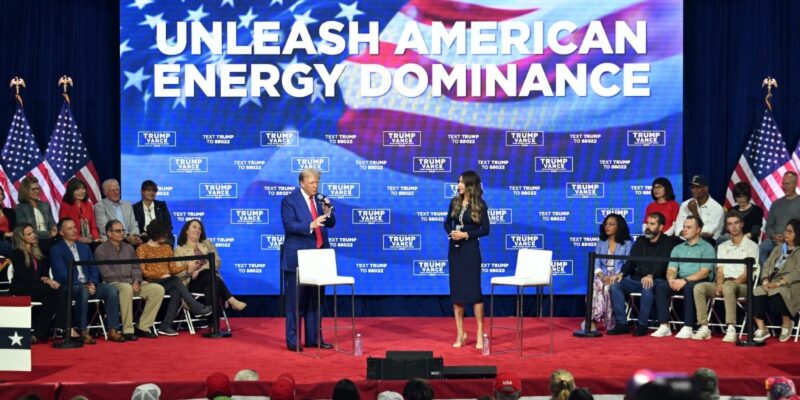
This story was originally published by Inside Climate News and is reproduced here as part of the Climate Desk collaboration.
The final days of this election season are wearying for the people who do research and advocacy on the transition away from fossil fuels.
For this group, the Biden administration has been a champion, developing landmark legislation and building a policy team that included some of the brightest experts from universities and think tanks. Vice President Kamala Harris would continue on this path.
And yet, polling indicates that there is about a 50-50 chance that President Joe Biden’s successor will be former president Donald Trump, whose antipathy for the energy transition includes talk of “wind cancer” and close ties to the oil industry.
I spoke with four nonprofit leaders this week to get an idea of how they are feeling about the election. All of the groups they represent are nonpartisan, but their worldviews tend to be much more in line with those of Harris than Trump.
“We need to pick up the pace, and that certainly will not be the case under the wrong federal leadership.”
“I feel very nervous, because this election seems like it’s going to be very close, and one of the candidates is an anti-democratic fascist who seems not to be interested in respecting the results of what are very safe and secure elections,” said John Farrell, co-director of the Institute for Local Self-Reliance.
His organization, with offices in Washington, DC, Portland, Maine, and Minneapolis, works to make energy systems more democratic by decentralizing the sources of electricity and encouraging community ownership of utilities.
The Biden administration has taken many actions that support the institute’s agenda, including extending and expanding incentives for rooftop solar.
“This could be really stressful next week for people, and everybody’s going to react in different ways,” he said. “Some people might be like, ‘I just want to bury myself in my work,’ and other people may be like, ‘I need to take two days off and just not look at anything.’”
Sonia Aggarwal, CEO of the think tank Energy Innovation, came to her current role after serving in the Biden administration as special assistant to the president for climate policy, innovation, and deployment.
“Just looking at the two paths we have in front of us, I would say they could not be more different in terms of American leadership, in terms of our economy and, of course, in terms of climate and our energy choices,” she said. “I think they couldn’t be more different in terms of the capability for people to have good lives and take control of their energy bills, reduce those energy bills and make them less volatile.”
Energy Innovation, based in San Francisco, does analysis of what various policy options would do for the climate, public health and energy markets.
“I think it’s a stark choice, and there’s no minimizing that,” she said.
One comfort, she said, is that renewable energy technologies are inexpensive and will grow in the market regardless of who is president. But policies matter a lot, and can hinder the rate of growth. “We need to pick up the pace, and that certainly will not be the case under the wrong federal leadership,” she said.
I found less alarm when talking to people who mainly work with state governments.
“Clean energy is a bipartisan issue,” said Simon Mahan, executive director of the Southern Renewable Energy Association, a trade group based in Little Rock, Arkansas. “While all eyes will be on the presidential election, arguably the state-level elections have a larger impact on the nation’s energy policy.”
Inside Climate News has written about some of these state-level races, including three seats on the Arizona Corporation Commission and one seat on the Texas Railroad Commission. “State-level energy policy has been an underappreciated venue for supporting reliable, clean, low cost energy resources,” he said.
Bernadette Del Chiaro, executive director of the California Solar and Storage Association, agrees. Her trade group is based in Sacramento.
“Obviously there’s a lot of attention on the top of the ticket this year but what matters most for the transition to clean energy is who sits in your governor’s office, who runs your state legislature and how many local mayors champion rooftop solar,” she said.
Her view is informed by recent clashes with California Gov. Gavin Newsom on a variety of issues that affect the financial benefits of solar and energy storage.
“Despite the actions of the Biden administration and Congress, the Newsom administration clobbered rooftop solar, costing us tens of thousands of jobs, dozens of company bankruptcies and set our market back 10 years,” she said. “The same could be said about the experiences of Hawaii, Arizona and other states.”















